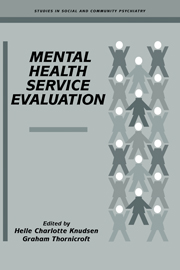Book contents
- Frontmatter
- Contents
- List of contributors
- Foreword
- Preface
- Part I INTRODUCTION
- Part II COMPREHENSIVE SERVICE EVALUATION PROJECTS
- Part III METHODS: MEASUREMENT, STRATEGIES AND NEW APPROACHES
- Part IV SYSTEM-LEVEL RESEARCH
- Part V PROGRAMME-LEVEL RESEARCH
- 16 Randomised controlled trials of programmes
- 17 Individual patient outcomes
- 18 Caregiving in severe mental illness: conceptualisation and measurement
- 19 Needs assessment
- Part VI HEALTH ECONOMICS IN MENTAL HEALTH
- Index
18 - Caregiving in severe mental illness: conceptualisation and measurement
from Part V - PROGRAMME-LEVEL RESEARCH
Published online by Cambridge University Press: 05 August 2016
- Frontmatter
- Contents
- List of contributors
- Foreword
- Preface
- Part I INTRODUCTION
- Part II COMPREHENSIVE SERVICE EVALUATION PROJECTS
- Part III METHODS: MEASUREMENT, STRATEGIES AND NEW APPROACHES
- Part IV SYSTEM-LEVEL RESEARCH
- Part V PROGRAMME-LEVEL RESEARCH
- 16 Randomised controlled trials of programmes
- 17 Individual patient outcomes
- 18 Caregiving in severe mental illness: conceptualisation and measurement
- 19 Needs assessment
- Part VI HEALTH ECONOMICS IN MENTAL HEALTH
- Index
Summary
Introduction
Severe mental disorders such as schizophrenia, bipolar and major depression, and personality disorders may represent obstacles to independent living and life satisfaction for those who suffer from them. Employment opportunities may be reduced, self-care may be impeded, and the capacity for social relationships may be severely diminished. In most cases these problems involve a serious disruption of the patient's expected life course, and may have profound caregiving consequences for family members. It is in this sense that family or caregiver burden is relevant to mental health service evaluation.
The purpose of this chapter is to assist mental health services researchers in conceptualising and measuring family burden. We elaborate the concept of caregiving and set it within the context of changing policies towards adult persons with severe mental disorders, provide a summary of studies of family burden and mental illness since the 1950s, and discuss methodological issues in conducting family burden research. A major point to be discussed is how caregiver burden may be incorporated as a measure in mental health service evaluation. The chapter concludes with implications for improving family outcomes and needs for future research.
Over the life cycle, caregiving can involve parents caring for a mentally ill adult child, adult children caring for a mentally ill parent, a well spouse caring for an ill spouse, or a sibling caring for a disabled brother or sister. Excluded from this chapter, although important, are caregiving to minor children with serious developmental disorders and to the elderly with dementias (see Biegel et al., 1991).
The concept of caregiving
Caregiving needs to be distinguished from dependency relationships that are age appropriate and culturally expected. We begin and may end our lives with a period of dependency during which it is crucial to our own survival and that of our species that others provide care and support. The institution that typically provides this care is the family unit. Kinship ties are among the most enduring of all supports available, although expectations may vary from culture to culture, and from one historical era to another. In modern industrialised societies, adult persons are expected to be independent of their family of origin and to care for themselves from the moment they end their education until they retire from the (paid) labour force.
- Type
- Chapter
- Information
- Mental Health Service Evaluation , pp. 296 - 316Publisher: Cambridge University PressPrint publication year: 1996
- 11
- Cited by



